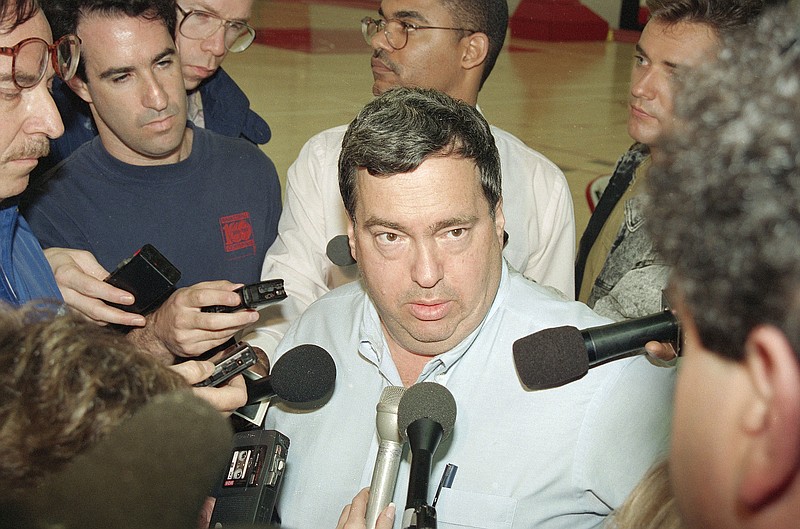Nine hours, 42 minutes and 21 seconds.
That's how long it took for any Chicago Bulls player or head coach Phil Jackson to say something nice about the late Bulls general manager Jerry Krause in the just-completed 10-hour documentary "The Last Dance."
This is not to say that Krause didn't deserve a fair amount of criticism for dismantling the Bulls at the close of their sixth NBA championship in eight years after the 1998 title.
But it wasn't only Krause who tore down the dynasty he'd helped build with more than a little help from Michael Jordan. Owner Jerry Reinsdorf also deserves more than a slight rebuke for his role in the Bulls' demise, because he's the guy who no longer wanted to sign the checks needed to keep the team together for a run at a seventh title.
Or as Reinsdorf noted late, late in Sunday's final episode, a statement to bring a stunned, frustrated facial reaction from Jordan: "After the sixth championship, things were beyond our control. It would have been suicidal at that point in their careers to bring back (Scottie) Pippen, Steve Kerr, (Dennis) Rodman, Ron Harper because their market value was going to be too high. They weren't going to be worth the money they were going to get on the (open) market."
That was certainly true of Pippen, who made most of the money he earned in NBA contracts, more than $100 million total, after he left the Bulls.
As for the rest, the two Jerrys wouldn't be the first front office team to embrace the idea that it's better to cut loose a player (or four) too early rather than too late. That's not to say they were right to break up the Bulls. They weren't. But the business of sports and romance of sports are often at odds.
Or as Jordan said of Reinsdorf's words: "It's maddening, because I felt like we could've won seven. I really believe that. We may not have, but man, just to not be able to try, that's something that I just can't accept for whatever reason. I just can't accept it."
It is tough to accept the way one of the greatest runs in NBA history came to a premature end. The Bulls, all the Bulls, but especially Jordan, deserved a chance to defend their title until they lost it.
And they might well have lost it the following season, given that the San Antonio Spurs crushed the New York Knicks 4-1 in the 1999 championship round.
But MJ never lost in the NBA Finals, and it's hard to imagine him losing to the Spurs if Jackson had returned as coach, Pippen as the wing man and Rodman the rebounding machine.
Instead, none of the four came back and the Bulls haven't so much as gone back to the NBA Finals since then. In fact, they've won but five playoff series total, only once advancing past the second round. Talk about suicidal.
Still, to return to Krause, he also showed some pretty remarkable instincts over the years for shaping not only the Bulls dynasty for two very different three-peat runs, but also once encouraging the Baltimore Bullets to take "The Pearl" Monroe out of Winston-Salem State in the 1967 NBA draft.
As when he picked Pippen out of Central Arkansas or Charles Oakley out of Virginia Union, Krause showed a remarkable knack for finding out-of-this-world NBA talent in out-of-the-way places.
But the old line about a person's greatest strength also becoming their greatest weakness may also have been true of Krause. He began to believe his own hype, that the reason the Bulls were winning was at least as much because of him as Jordan.
He did help, of course. Oh, did Krause help. He removed Doug Collins as coach in favor of Jackson. He traded Jordan favorite Oakley for Bill Cartwright, who could neutralize physical centers such as the New York Knicks' Patrick Ewing. For the second Bulls three-peat from 1996 to 1998, he brought in Rodman. For those moves alone, he richly deserved to be saluted at least as much as he was savaged.
Perhaps because his death in 2017 meant he couldn't defend himself in 2020, the first 582 minutes and 21 seconds of the "The Last Dance" chose to focus on Jordan's constant demeaning of Krause for being a short, chubby slob instead of giving him at least a wee bit of credit for putting together those six NBA title teams in eight seasons.
But then it happened, and out of the mouth of the least happy Bull: Pippen.
You could make an argument that Krause's determination to land Pippen out of NAIA member Central Arkansas just might go down as one of the three savviest moves in NBA history. The other two would be the Boston Celtics drafting Larry Bird in 1978, which was the year before he led Indiana State to the NCAA title game, a bit of genius that led to an NBA rule change, and the Los Angeles Lakers convincing the Charlotte Hornets to draft high school sensation Kobe Bryant with the 13th pick of the 1996 draft, then trading him to L.A. for Vlade Divac.
All three moves led to multiple NBA titles for those franchises, though no one was predicting that at the moment they took place.
And perhaps because of that, Pippen said of Krause inside the final 12 minutes of TLD: "We can't knock him. We have to give him credit. And he deserves credit for being the general manager of those teams."
He does indeed. Blame Krause all you want for dismantling the Bulls. He deserves it. But he deserves at least as much credit, if not more, for building them, because it's always more difficult to build something than bulldoze it.
Contact Mark Wiedmer at mwiedmer@timesfreepress.com. Follow him on Twitter @TFPWeeds.

